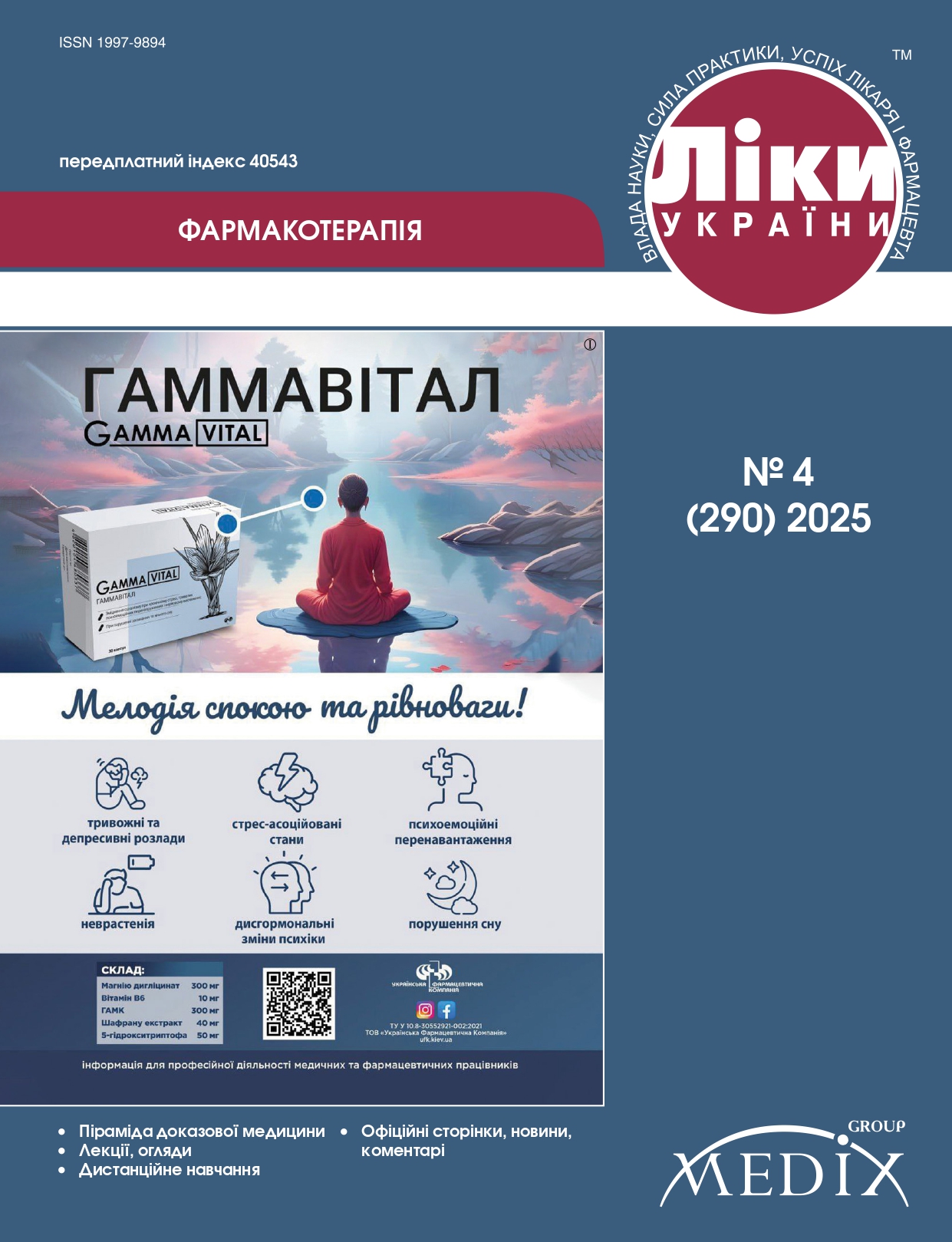Роль спадковості у патогенезі інфаркту міокарда
DOI:
https://doi.org/10.37987/1997-9894.2025.4(290).332923Ключові слова:
серцево-судинні захворювання, аналіз спадковості, сімейний анамнез інфаркту міокарда, незалежний предиктор ризику інфаркту міокардаАнотація
У статті розглядаються питання аналізу спадковості у патогенезі інфаркту міокарда (ІМ). Базуючись на основі результатів досліджень показано існування ризику розвитку ІМ за наявності сімейного анамнезу ІМ. У 2002 році фахівцями Всесвітньої організації охорони здоров’я сімейний анамнез було виділено як незалежний предиктор ризику ІМ, при цьому предиктивна роль цього фактора не залежала від статі, віку, етнічних, географічних, соціально-економічних та традиційних факторів ризику. Виходячи з отриманих даних, у подальшому були ініційовані дослідження, спрямовані на більш детальний аналіз спадковості у патогенезі ІМ. Таким чином, обтяжений сімейний анамнез є одним із основних факторів ризику серцево-судинних захворювань.
Посилання
Mathers C. D. Projections of global mortality and burden of disease from 2002 to 2030 / C. D. Mathers, D. Loncar // PLoS Med. – 2006. – Vol. 3. – e442.
Heart disease and stroke statistics – 2006 update: a report from the American Heart Association Statistics Committee and Stroke Statistics Subcommittee / T. Thom, N. Haase, W. Rosamond [et al.] // Circulation. – 2006. – Vol. 113. – P. e85–151.
Effect of potentially modifiable risk factors associated with myocardial infarction in 52 countries (the INTERHEART study): casecontrol study / S. Yusuf, S. Hawken, S. Ounpuu [et al.] // Lancet. – 2004. – Vol. 364. – P. 937–952.
Chow C.K., Islam S., Bautista L. [et al.] Parental history and myocardial infarction risk across the world: The INTERHEART study / C. K. Chow, S. Islam, L. Bautista [et al.] // J. Am. Coll. Cardiol. – 2011. – Vol. 57. – P. 619–627.
European guidelines on cardiovascular disease prevention in clinical practice: executive summary / I. Graham, D. Atar, K. Borch-Jonsen [et al.] // Eur. Heart J. – 2007. – Vol. 28. – P. 2375–2414.
European Guidelines on cardiovascular disease prevention in clinical practice (version 2012) / Joep Perk, Guy De Backer, Helmut Gohlke [et al.] // Eur. Heart J. –2012. – Vol. 33. – P. 1635–1701.
Usefulness of cardiovascular family history data for population-based preventive medicine and medical research (the Health Family Tree Study and the NHLBI Family Heart Study) / R.R. Williams, S.C. Hunt, G. Heiss [et al.] // Am. J. Cardiol. – 2001. – Vol. 87. – P. 129–135.
Outcomes of interest in evidence-based evaluations of genetic tests / J. R. Botkin, S. M. Teutsch, C. I. Kaye [et al.] // Genet. Med. – 2010. – Vol. 12. – P. 228–235.
Association between a literature-based genetic risk score and cardiovascular events in women / N. P. Paynter, D. I. Chasman, G. Pare [et al.] // JAMA. – 2010. – Vol. 303. – P. 631–637.
Two years after molecular diagnosis of familial hypercholesterolemia: majority on cholesterol-lowering treatment but a minority reaches treatment goal / R. Huijgen, I. Kindt, S. B. Verhoeven [et al.] // PLoS One. – 2010. – Vol. 5. – e9220.
Genetics and heritability of coronary artery disease and myocardial infarction / B. Mayer, J. Erdmann, H. Schunkert // Clin. Res. Cardiol. – 2007. – Vol. 96. – P. 1–7.
Fifteen percent of myocardial infarctions and coronary revascularizations explained by family history unrelated to conventional risk factors. The Reykjavik Cohort Study / M. B. Andresdottir, G. Sigurdsson, H. Sigvaldason, V. Gudnason // Eur. Heart J. – 2002. – Vol. 23. – P. 1655–1663.
Barrett J. A genomewide linkage study of 1,9. A comprehensive linkage analysis for myocardial infarction and its related risk factors / J. Barrett, T. Bishop, A. Hall // Nat. Genet. – 2002. – Vol. 30. – P. 210–214.
Balmforth 33 families affected by premature coronary artery disease: The British Heart Foundation (BHF) Family Heart Study / N. J. Samani, P. Burton, M. Mangino, S. G. Ball // Am. J. Hum. Genet. – 2005. – Vol. 77. – P. 1011–1020.
Vehaskari V. M. Heritable forms of hypertension / V. M. Vehaskari // Pediatr. Nephrol. – 2009. – Vol. 24. – P. 1929–1937.
Paul M., Zumhagen S., Stallmeyer B. [et al.] Genes causing inherited forms of cardiomyopathies. A current compendium / M. Paul, S. Zumhagen, B. Stallmeyer [et al.] // Herz. – 2009. – Vol. 34. – P. 98–109.
Identification of rare forms of autosomal dominant heritability of myocardial infarction / B. Mayer, M. Fischer, J. Erdmann [et al.] // Circulation. – 2002. – Vol. 106. – II–290.
Mutation of MEF2A in an inherited disorder with features of coronary artery disease / L. Wang, C. Fan, S. E. Topol [et al.] // Science. – 2003. – Vol. 302. – P. 1578–1581.
Lack of association between the MEF2A gene and myocardial infarction / Lieb W., Mayer B., Konig I.R. [et al.] // Circulation. – 2008. – Vol. 117. – P. 185–191.
Genomewide association analysis of coronary artery disease / N. J. Samani, J. Erdmann, A. S. Hall [et al.] // N. Engl. J. Med. – 2007. – Vol. 357. – P. 443–453.
A common allele on chromosome 9 associated with coronary heart disease / R. McPherson, A. Pertsemlidis, N. Kavaslar [et al.] // Science. – 2007. – Vol. 316. – P. 1488–1491.
A common variant on chromosome 9p21 affects the risk of myocardial infarction / A. Helgadottir, G. Thorleifsson, A. Manolescu [et al.] / Science. – 2007. – Vol. 316. – P. 1491–1493.
Repeated replication and a prospective meta-analysis of the association between chromosome 9p21.3 and coronary artery disease / H. Schunkert, A. Gotz, P. Braund [et al.] // Circulation. – 2008. – Vol. 117. – P. 1675–1684.
Gene dosage of the common variant 9p21 predicts severity of coronary artery disease / S. Dandona, A. F. R. Stewart, L. Chen [et al.] // J. Am. Coll. Cardiol. – 2010. – Vol. 56. – P. 479–486.
The chromosome 9p21 risk locus is associated with angiographic and progression of coronary artery disease / Patel R.S., Su S., Neeland I.J. [et al.] // Eur. Heart J. – 2010. – Vol. 31. – P. 3017–3023.


